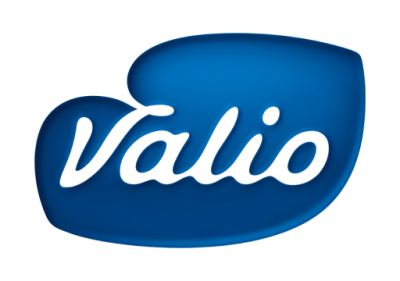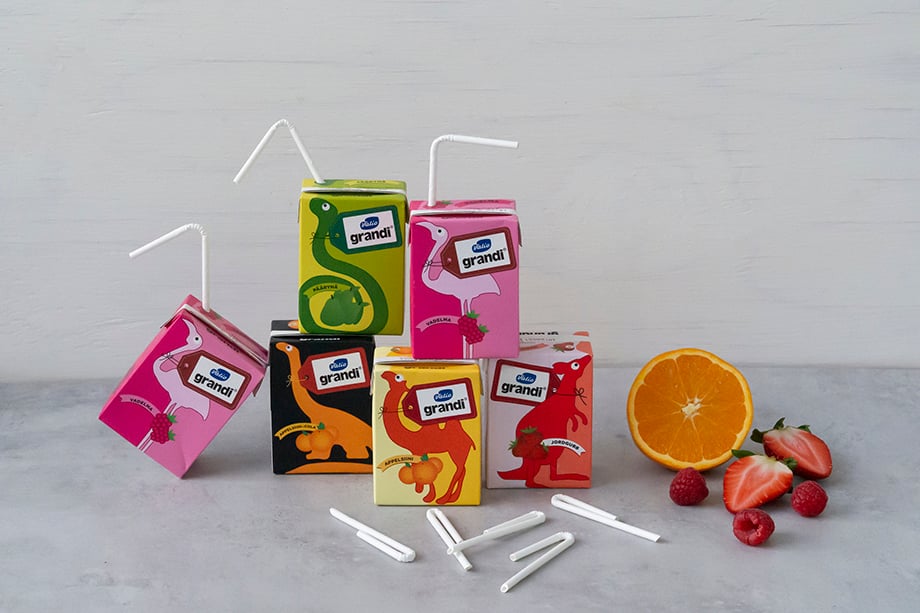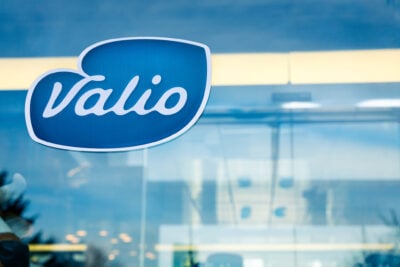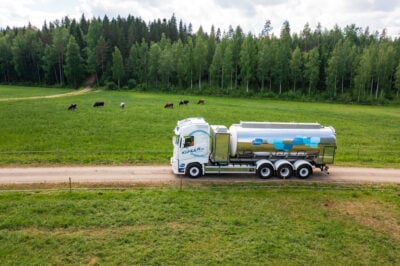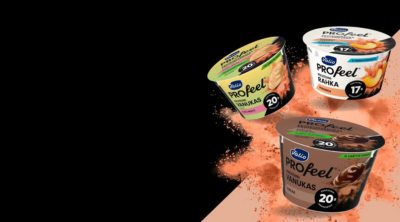Food packaging and packaging materials are small things of great importance in our daily lives. The purpose of packaging is to protect the food, ensure hygiene and improve the shelf life of the product. Packaging accounts for only a small share of the product’s carbon footprint, but it still has an important role in Valio’s climate work as a whole. In 2020, 24 per cent of Valio’s plastic packaging was plant-based. The amount of packaging produced from recycled plastic was 250 tonnes, which is equivalent to 10.9 million half-litre bottles used in the deposit-refund system.
Plastic is a much discussed topic because of its environmental impacts. Packaging usually only accounts for a few per cent of the carbon footprint of an individual product, but the combined effect of millions and millions of packages makes the choice of materials significant.
The most important purpose of packaging is to protect the food. In the case of food products, the greatest waste is spoiled food that has to be disposed of. So far, the properties of plastic make it by far the best raw material for safe food packaging and the prevention of food waste. Therefore, Valio is trying to use it even more environmentally wisely and more efficiently.
“Hundreds of different products are manufactured every day at Valio’s plants in Finland alone, and roughly a billion pieces of product packaging are used each year. Last year, we removed plastic lids and spoons from the packaging of Valio PROfeel® puddings, and this alone reduced the annual consumption of plastic packaging by approximately 150,000 kilos. This is equivalent to about seven million plastic carrier bags”, says Juhana Pilkama, who is responsible for packaging development at Valio.
Cutting down on plastics is one of Valio’s own sustainability targets, and many environmentally friendly innovations are created thanks to ordinary shoppers.
“We have received a lot of feedback calling for a reduction in the use of plastic. In 2020, we reduced our plastic use by a total of 485,000 kilos. For example, Valio’s cheese slices now come in thinner packages than before, and in the spring of 2021, paper straws will replace plastic ones in Valio Grandi® juice cartons. Smart, environmentally savvy packaging also makes recycling at home easier. The redesigned cheese package can be squeezed into a small ball, and it takes up little space in the plastic collection box”, Pilkama continues.
In addition, Valio is currently updating the recycling labels on its packages. Plain-language recycling labels on packaging are now even easier to find, making the everyday life of consumers easier.
Recycled plastic bottles get a new life on the cheese shelf
Valio was one of the first food companies to start using recycled plastic packaging in 2019. Recycled plastic bottles are recycled in cheese packaging – plastic bottles recycled in Finland make up for more than half of the new cheese slice packages. Recycled plastic is used in the packaging of Valio MiFU® products and triangular gourmet cheeses. We have also stopped using black plastic in packaging because it is difficult to recycle at plastic recycling facilities.
Valio has worked systematically to minimise the environmental impact of its products. All Valio packaging has been compatible with collection systems since 2010. In 2020, 24 per cent of Valio’s plastic packaging was plant-based. The amount of packaging materials produced from recycled plastic was 250 tonnes, which is equivalent to 10.9 million half-litre bottles used in the deposit-refund system. This year, we are gradually introducing plastic cups that are suitable for cardboard recycling. This will significantly reduce the amount of plastic we use.
Going forward, Valio will continue to reduce the use of plastic in general and increase the use of recycled plastic, as well as favouring plant-based materials in its packaging. The circular economy is also becoming more important.
Juhana Pilkama says that plastic is not a bad packaging material, but what happens to the plastic packaging after use can make it harmful to the environment.
“The versatile utilisation of recycled plastic is important. This is still a new challenge for us and our industry. Our goal is to reduce our use of plastic by 20 per cent by 2025, to keep increasing our use of plant-based packaging materials and to make recycling even easier, for example, by labelling. It’s important for us to continue combating food waste, and packaging is key in this fight. Plastic cannot yet be completely replaced in the packaging of long-life food products. However, we are striving to reduce the amount of plastic to a minimum, without compromising the product’s shelf life”, Juhana Pilkama sums up.
Valio’s goal is to reset milk’s carbon footprint to zero by 2035.
